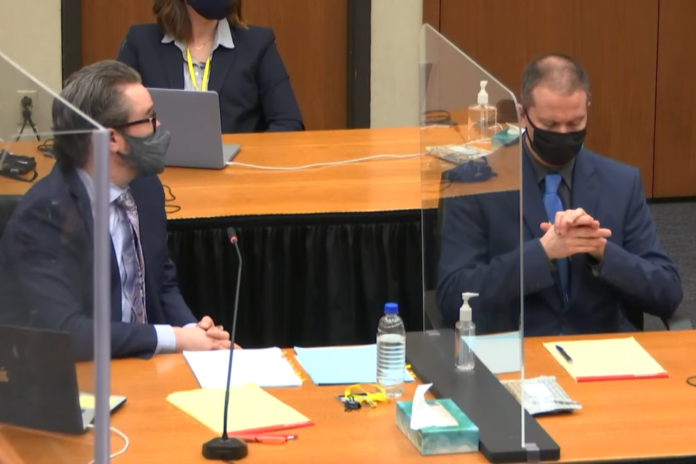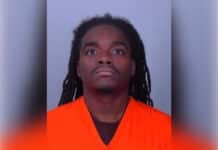
(Power Line) — When I was trained in as a trial lawyer defending companies in personal injury litigation, I was instructed by one of my mentors at the firm that we wanted to avoid post office workers on the jury. His advice became something of a standing joke. It may even have been a standing joke at the time I joined the firm, but watching voir dire in this case over the past two weeks has brought it back to mind.
We haven’t had a post office worker so far, but we have had public school teachers. They have proved to be the functional equivalent of post office workers in this case as to defendant Derek Chauvin, but then again, who in Hennepin County isn’t?
The State has invested in jury consultant Christina Marinakis to advise the numerous lawyers working to put Chauvin away. She has been in court at counsel table every day so far. Given the fact that the average Hennepin County juror comes in with a negative attitude to Chauvin and a hostile opinion of his conduct in the famous video, I wonder why her services are necessary.
They are necessary because, whatever the outcome, Attorney General Keith Ellison doesn’t want his handling of the case to be second-guessed. He wants to be able to say he did everything in his power to convict Chauvin of the murder of George Floyd. After all, he’s up for reelection next year.
I take it from the examination conducted so far that the optimal juror for the prosecution is a public school teacher. Defense counsel Eric Nelson has rightly struck the two who have been called for voir dire. They would have been a nightmare for the defense.
I’m sure Ms. Marinakis has gone over the juror questionnaires and rendered a sophisticated assessment of who is most likely to have an open mind to Chauvin’s defense. Jurors with an open mind to Chauvin’s defenses are the best that he can hope for and the State is making sure that they stay off the jury. The State exercises its peremptory strikes on them.
Does any prospective Hennepin County juror really have an open mind on Chauvin? We found one yesterday, but he won’t be on the jury. The optimal defense juror is the deer hunter. He was juror number 116.
When juror number 116 identified within the first minute or so of his examination by Nelson as an avid fisherman — he fishes competitively — I guessed he would be good for Chauvin. He also identified in response to Schleicher’s examination as a deer hunter.
He had heard about the settlement of the wrongful death lawsuit and was concerned about the safety of his family in the event he served on the jury, but his view of Chauvin was “neutral.” Further, his view of Black Lives Matter was “somewhat unfavorable.” Why? Because he “doesn’t think that riots help.” He didn’t necessarily want to serve as a juror, but he felt that he could “absolutely” be fair and impartial. Schleicher spent a few minutes following up before using a peremptory challenge to strike him.
I start with juror number 116 because he stuck out. Chauvin didn’t have a crack at many like him over the past two weeks and it didn’t take Schleicher long to figure that the State didn’t want him. I hope they didn’t pay the big bucks for that advice.
I thought the prosecution counterpart to juror number 116 yesterday was juror number 118, but she made it onto the jury. She was the fourteenth juror seated in the case. Having been passed for cause by both Schleicher and Nelson, she will serve as an alternate.
After her selection, we were apprised by the court that she is a white woman in her 20s. She too professed indifference about her possible service on the jury. When she identified at the outset as a social worker, however, I thought Nelson needed to strike her. She sounds like an honest and empathetic woman. If you were in trouble, you would want to seek help from her.
She wants to hear everyone out. She wants to hear both sides of this case. Her impressions of both George Floyd and Derek Chauvin were “somewhat negative to neutral.” She wondered what prompted Chauvin to place his knee on Floyd’s neck. She wants to hear about Chauvin’s police training. As a social worker, she was trained to support everyone and extend “basic respect” to all. Based on her training as a social worker, she looks at every side of the issues she deals with.
She must live in a Minneapolis suburb. When the riots hit following Floyd’s death, she was afraid of the migration of the violence to the suburbs. She also must have a handle on the reality principle insofar as she is concerned about her identification as a juror. However, she assured Nelson that she would not allow her concerns to affect her verdict. I would have wanted to hear more about that.
When Nelson passed her for cause, it was obvious she would pass muster with the prosecution. I don’t think you need a jury consultant to tell you that a social worker fits the profile of a juror who is likely to be favorable to the prosecution. Without knowing anything about the prospective jurors who are up next, I thought Nelson should have pressed her harder on the question of fear and on her commitment to impartiality. I thought he should have struck her if he couldn’t make out a challenge for cause.
We began the day with juror number 115. She was probably the true counterpart to the deer hunter. She is a nursing assistant who expressed no concerns for her physical safety. She was okay with the release of her name by the court at some point in the future when it is deemed safe. I take it that she does not contemplate a possible not guilty verdict and related consequences.
Her view of Chauvin is “somewhat negative.” George Floyd should not have had to die. It “was not his time to go.”
Did we need more? She participated in one of the protests within a week of Floyd’s death. She made a sign to march with a friend in the protest. (I missed what the sign said.)
She strongly agrees that blacks are not treated equally in the criminal justice system. Where did she get the information to support her opinion? She took a “gendered woman studies class in college.” Need I add that her opinion of Black Lives Matter is “very favorable.”
As Roberto Duran put it, “No más!” I don’t think Judge Cahill would have granted a challenge for cause, but Nelson didn’t try. He used a peremptory strike on her.
Juror number 117 confessed that her English was insufficient to follow expert testimony or even instructions in the law such as the presumption of innocence. Judge Cahill excused her for cause on his own motion.
Like everybody else, juror number 119 had heard about the world-beating settlement of the case by the city of Minneapolis for $27 million. He conceded that it affected his view of the case. He understood the presumption of innocence but he didn’t think he could afford it to Chauvin. Judge Cahill excused him for cause on his own motion.
Ditto juror number 120.
Juror number 121 presented as another case study in the profile of a juror adverse to Chauvin despite professing to be fair and impartial. He has worked in a retail warehouse for three years. He wants to serve as juror in the case and he has strong opinions about it.
When he described himself early on as interested in philosophy and social issues, I thought Nelson would have to strike him. The alternative title of Nietzsche’s Twilight of the Idols is How to Philosophize with a Hammer. This guy wanted to philosophize with a hammer on the jury.
He has watched the bystander video. He has watched the body cam video. He has a “very negative” opinion of Chauvin. He was of the view that Chauvin “used unnecessary and excessive force.” He thought that Floyd’s death resulted from it. And so on, and so on.
Yet he professed his ability to be neutral. In a sidebar out of our hearing, Nelson moved to strike him for cause. Judge Cahill denied the challenge for cause, but expressly found that the juror was evasive and lacking in credibility.
Nelson exercised another of his peremptory challenges to strike the juror and cited the Minnesota Court of Appeals’ McKinley case in support of his challenge for cause (“A district court does not err when it sustains a for-cause challenge of a juror … because the juror is untruthful, evasive, or lacking in candor during voir dire”). In response, Judge Cahill stated that he would revisit the question if Nelson ran out of peremptory challenges while we remain in search of the fifteenth juror — the third alternate — today.
The court is calling in twelve prospective jurors in search of a third alternate who will be released next Monday if the other fourteen show up. When we find the third alternate today, we will take a break until the commencement of the trial proper with opening statements next Monday.
In the summary provided by the court after juror 118 was seated , here are the fourteen jurors — the twelve regular and two alternates — who will decide this case:
• No. 2: white male; 20s
• No. 9: multi/mixed-race woman; 20s
• No. 19: white male; 30s
• No. 27: black male; 30s
• No. 44: white woman; 50s
• No. 52: black male; 30s
• No. 55: white woman; 50s
• No. 79: black male; 40s
• No. 85: multi/mixed-race woman; 40s
• No. 89: white woman; 50s
• No. 91: black woman; 60s
• No. 92: white woman; 40s
• No. 96: white woman; 50s
• No. 118: white woman; 20s
UPDATE: The Star Tribune has run an amplified version of the AP story on the striking of juror 76 that I commented on in part 10 of this series. The Star Tribune and AP falsely ramp up the racial angle in a case that has already done incalculable damage to the Twin Cities and the United States. These stories both omit the fact that Judge Cahill found the striking of juror 76 by the defense to be based on a legitimate nondiscriminatory reason: his arguable inability to sit as an impartial juror in the case. See my account in part 8 of this series.

















